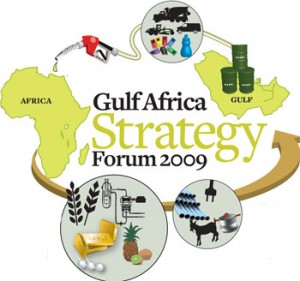 Khaleej Times | 23 February 2009
Khaleej Times | 23 February 2009
The Gulf-Africa Strategy Forum 2009 will endeavour to strengthen economic relations between the GRC and the African States and also seek opportunities to forge political and security alliances between both the regional flanks.
This Conference is an initiative launched by the Gulf Research Center (GRC) -- an independent think tank based in Dubai -- and will be held from February 24-26 in South Africa’s capital of Cape Town.
“The big emphasis of the Conference will be on economic aspects, both trade and investment” said Marie Bos, the programme moderator for the Gulf-Africa research programme at the GRC while talking to Khaleej Times.
The Gulf has been mainly involved in extractive industries such as oil and mineral exploration in Africa and investments in this sector have been primarily aimed to help develop capacity and related infrastructure. “The trade from Africa to the Gulf is mainly of primary commodities, whereas oil, petroleum products and manufactured goods constitute the bulk of trade from the Gulf States to Africa,” told Marie Bos.
The mining sector has seen mainly private investments, in the mining of gold, copper, iron and platinum. Other sectors that had seen major investments were in the development of infrastructure, telecommunications and agriculture. The lack of systematic collection of data and categorising private and official investments from the Gulf has made it difficult to reach an accurate estimate of total investments, made so far.
|
Food Security Deals • Saudi Arabia-Ethiopian Food Supply Relations Development: Ethiopiais offering 100 per cent exemption from customs duties and other taxes levied on imports to investors Saudi investment. • Eritreahas sought Kuwait's attention to the investment opportunities it offers, especially in the agricultural sector.• Rwanda is actively trying to attract Qatari agricultural investment by canceling restrictions on FDI linked to its agricultural sector. • Qatarhas asked Kenya to lease it 40,000 hecatres of land to grow crops in return for funding a $5.6 billion port on the tourist island of Lamu off Kenya's northern coast.• Abu Dhabi announced plans in July 2008 to develop over 70,000 acres of farmland in Sudan. • UAEhas farms in several Sudanese provinces, including a 40,000-feddan (1 feddan is 4,200 square metres) farm where wheat and corn are grown.• February 2009, Hail Agricultural Development Co., a farming company in northeast Saudi Arabia, said that it plans to invest $45 million in Sudan. • Mid-2007, Saudi Arabia announced that it is negotiating with Sudan to allow Saudi companies to invest in food production. |
The conference is expected to have a heavy Saudi participation with a 60-member delegation coming from the Ministry of Trade and Commerce from the Kingdom. The GCC Secretariat is also sending its Under Secretary of Economic Affairs. The UAE will be sending one member from the Ministry of foreign trade to attend the conference. Participants of the African Union Commission and representatives from African and major commercial enterprises will also be present for the event.
Apart from focusing on economic ties, the forum will also put forth the idea of a Gulf-Africa political alliance. Political representatives from both regional blocs will meet and discuss the possibility of extending bilateral ties to tackle security issues in addition to looking at the formation of a GCC-African Union alliance. Such an alliance is hoped to give a united voice to two separate entities that currently do not enjoy a strong, international standing like the EU.
The security issues affecting the region have also become a major concern to the international community. Piracy, narcotics and human trafficking, arms smuggling and terrorism are the most prominent security issues that affect both the Gulf and Africa. The conference will also focus on the role of the Gulf States as providers of development aid to African states. Since the Tsunami disaster in 2005, the Gulf States have diversified to include non Islamic states as the recipients of aid.













